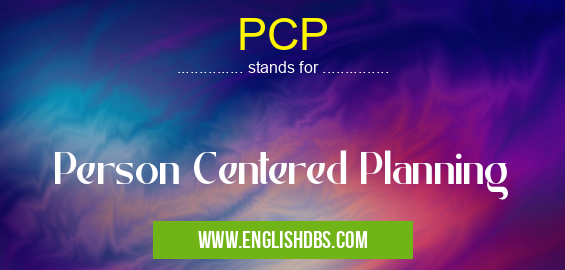What does PCP mean in GENERAL
PCP stands for Person-Centered Planning, which is an approach used to achieve personal growth and development. It involves taking a holistic view of the individual's needs and wants, rather than relying on predetermined plans or assessments. PCP focuses on the individual as a whole person, taking into account their history, interests, abilities, and values. This approach looks at each person's unique strengths and potentials, rather than focusing only on deficits and weaknesses. PCP is based on the belief that everyone has a right to be heard, respected, and included in decision-making processes that affect them. PCP helps ensure that individuals with disabilities are given the opportunity to express their desires about how they want their own lives to unfold.

PCP meaning in General in Business
PCP mostly used in an acronym General in Category Business that means Person Centered Planning
Shorthand: PCP,
Full Form: Person Centered Planning
For more information of "Person Centered Planning", see the section below.
Benefits Of PCP
The main benefits of PCP include improved quality of life for individuals with disabilities by having more control over their own lives; increased involvement of those who are being served in decisions that affect them; enhanced coordination among service providers; improved assessment data collection; and more effective use of resources. Additionally, PCP helps promote self-determination skills among those receiving services so they can better manage any changes or challenges that arise throughout their lives. Ultimately, PCP enables these individuals to make decisions about their future without feeling disadvantaged by physical or mental impairments – thus enabling them to live full lives alongside others in society without discrimination or stigma.
Essential Questions and Answers on Person Centered Planning in "BUSINESS»GENERALBUS"
What is Person Centered Planning?
Person Centered Planning (PCP) is an individualized approach to long-term planning and service delivery that explores both the needs and dreams of people with a disability, as well as their gifts and strengths. PCP helps individuals understand what’s important in their life, set meaningful goals, and connect with resources.
How is PCP different from traditional planning?
The traditional approach typically starts by assessing deficits and then creates a plan to address those deficits. In contrast, the person centered approach begins by exploring the gifts/strengths of the individual first and building on these assets to achieve success.
Does PCP focus on behavioral change?
No, PCP does not focus on behavior change. Rather, it is focused on understanding an individual's vision for their life - what they are passionate about achieving - so that supports can be developed accordingly.
Who can benefit from Person Centered Planning?
Anyone who has a disability or chronic illness could benefit from PCP. Even if someone does not have a disability or chronic illness, it is still incredibly useful for helping them to plot out a path towards their goals.
How long does it take to complete a person centered plan?
It depends on how complex the plan needs to be, but generally it should not take more than two or three sessions to create a comprehensive plan. However, ongoing review meetings will need to be held in order to keep the plan up-to-date and relevant.
What are some potential benefits of PCP?
The primary benefit of PCP is its inclusionary nature; during planning all stakeholders have an opportunity to contribute in designing services that reflect each individual’s interests, talents and choices while also meeting basic service requirements. Other potential benefits include improved communication among stakeholders involved in providing supports/services and greater personal satisfaction for individuals receiving support services.
Who typically participates in creating a person centered plan?
Typically, close family members or friends participate in creating a personally tailored plan for an individual with disabilities or other challenges. Other stakeholders such as case managers, advocates or medical providers may also be involved depending on the situation and needs of the individual being served.
Is there any research showing effectiveness of using PCP?
Yes! Many studies have been conducted over the past decade which suggest that individuals utilizing Person Centred Planning demonstrate improvements in self-determination skills as well as positive outcomes related to overall goal attainment when compared with similar populations not employing this model of service delivery.
What happens after a person centered plan has been created?
Once the plan has been created it should be monitored periodically – usually every 6 months – to ensure that goals are being achieved according to timeline specified within the document itself. Any necessary amendments or adaptations can then be made at these reviews based upon changes in circumstance or information received from other sources associated with an individual’s support network.
What challenges may arise while implementing PCPs?
Challenges may arise during implementation due largely practical issues such as finding funding sources for services identified through plans or locating qualified personnel that possess necessary skillsets needed for providing prescribed supports recommended within plans themselves.
Final Words:
Person Centered Planning is an important tool for helping people with disabilities reach their full potential. By focusing on the whole individual – not just what’s wrong – it’s possible to identify areas where support could be beneficial which may improve quality of life for participants significantly over time. These types of plans also provide valuable insight into what could be done differently when creating more inclusive environments where all members feel welcome no matter what abilities they possess. Ultimately, PCP leads to increased independence along with happiness and success for those involved while fostering positive relationships between providers and participants alike.
PCP also stands for: |
|
| All stands for PCP |
